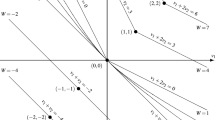Abstract
We study continuity properties of Arrovian social welfare functions in the infinite population framework. We show that continuous welfare functions satisfying unanimity and independence of irrelevant alternatives are dictatorial. Weak anonymity is shown to be incompatible with continuity and unanimity: every continuous weakly anonymous social welfare function must be a constant function.
Similar content being viewed by others
References
Armstrong TE (1980) Arrow's theorem with restricted coalition algebras. J Math Econ 7:55–75
Armstrong TE (1985) Precisely dictatorial social welfare functions. Erratum and addendum to Arrow's theorem with restricted coalition algebras'. J Math Econ 14:57–59
Arrow KJ (1950) A difficulty in the concept of social welfare. J Polit Econ 58:323–328
Arrow KJ (1951) Social choice and individual values. Wiley, New York
Arrow KJ (1963) Social choice and individual values, 2nd edn. Yale University Press, New Haven
Brown DJ (1974) An approximate solution to Arrow's problem. J Econ Theory 9:375–383
Fishburn PC (1970) Arrow's impossibility theorem: concise proof and infinite voters. J Econ Theory 2:103–106
Hansson B (1976) The existence of group preferences. Public Choice 28:89–98. (Working Paper 1972, Mattias Fremling Society No. 3.)
Kirman AP, Sondermann D (1972) Arrow's theorem, many agents, and invisible dictators. J Econ Theory 5:267–277
McManus M (1982) Some properties of topological social choice functions. Rev Econ Stud 49:447–460
Mihara HR (1997) Arrow's theorem and Turing computability. Econ Theory 10:257–276
Mihara HR (1997) Anonymity and neutrality in Arrow's theorem with restricted coalition algebras. Soc Choice Welf 14:503–512
Murakami Y (1968) Logic and social choice. Routledge and Kegan Paul, London
Schmitz N (1977) A further note on Arrow's impossibility theorem. J Math Econ 4:189–196
Acknowledgements
We are grateful to Prof. M. Salles and an anonymous referee for their valuable comments. I want to thank the Yrjö Jahnsson Foundation for financial support.
Author information
Authors and Affiliations
Corresponding author
Rights and permissions
About this article
Cite this article
Salonen, H., Saukkonen, K. On continuity of Arrovian social welfare functions. Soc Choice Welfare 25, 85–93 (2005). https://doi.org/10.1007/s00355-005-0030-x
Received:
Accepted:
Published:
Issue Date:
DOI: https://doi.org/10.1007/s00355-005-0030-x



